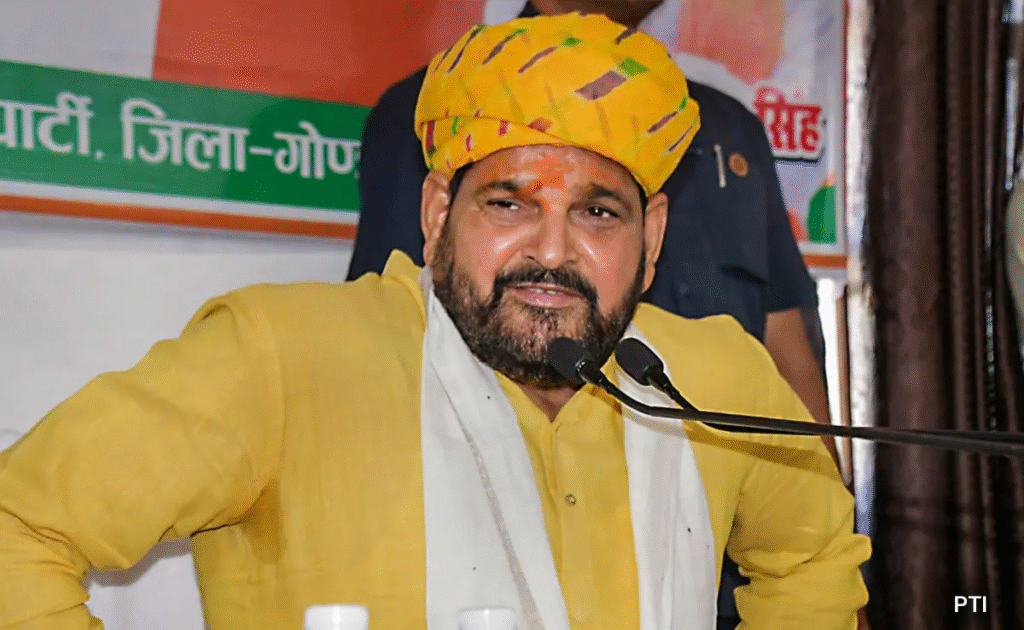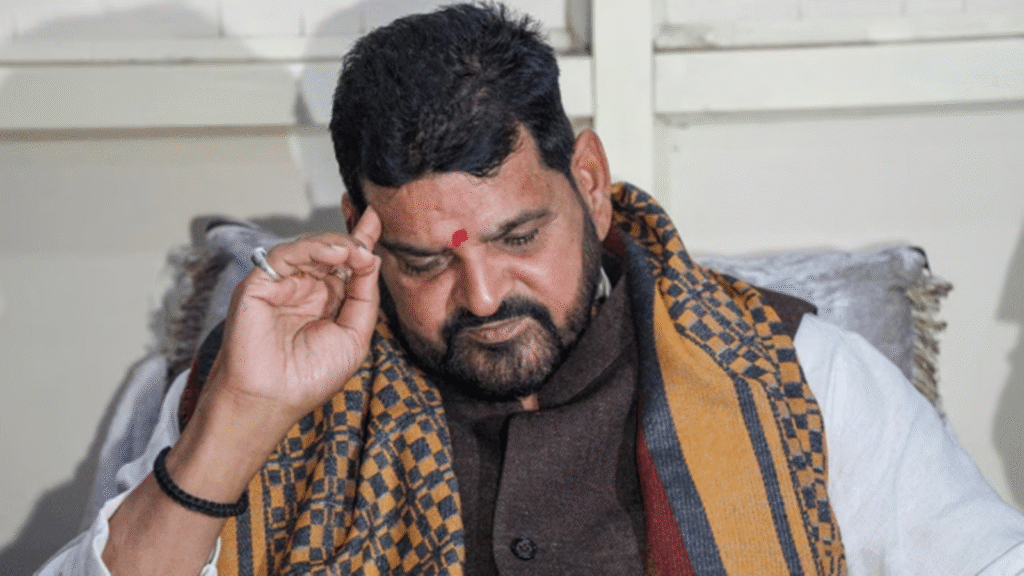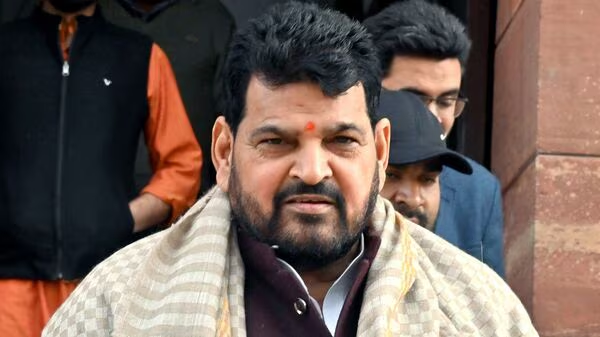
In a significant legal development, the Patiala House Court in Delhi has approved the police closure report, granting former Wrestling Federation of India (WFI) president and ex-BJP MP Brij Bhushan Sharan Singh a major relief in a POCSO (Protection of Children from Sexual Offenses) case. This decision marks a turning point in the controversial allegations that had cast a shadow over his political and administrative career.
Allegations and the Road to Legal Proceedings
Brij Bhushan Sharan Singh found himself at the center of a storm when allegations under the POCSO Act surfaced, accusing him of inappropriate conduct. The case drew widespread attention, especially given his prominent role in Indian sports administration and politics. The allegations were brought to light during a period of heightened scrutiny on the treatment of athletes and the accountability of those in positions of power.
The POCSO Act, enacted in 2012, was designed to protect children from offenses such as sexual assault, harassment, and pornography. The act places a strong emphasis on safeguarding minors, and allegations under this legislation carry serious legal and social implications. For Singh, the charges posed a significant threat to his reputation and career, making the court’s approval of the closure report a critical moment in his defense.
The police conducted a detailed investigation into the matter following the filing of the complaint. Their inquiry aimed to uncover the facts surrounding the allegations and evaluate their merit. The closure report submitted to the court stated that there was insufficient evidence to proceed with a formal trial against Singh under the provisions of the POCSO Act. This finding was pivotal in shaping the court’s decision to approve the closure of the case.
Patiala House Court’s Verdict
The Patiala House Court’s approval of the closure report effectively absolves Brij Bhushan Sharan Singh of the charges leveled against him in this particular case. The court’s decision was based on the findings of the police investigation, which failed to substantiate the claims made in the complaint. This ruling underscores the importance of evidence-based judicial proceedings and the principle of “innocent until proven guilty.”
In its ruling, the court acknowledged the detailed investigation carried out by the authorities and emphasized the absence of credible evidence to support the allegations. The judgment has not only provided relief to Singh but has also sparked discussions on the broader implications of such cases on public figures and the judicial process.
Legal experts have noted that the closure of this case highlights the judiciary’s reliance on objective evidence and thorough investigations. This approach ensures that accusations, no matter how serious, are scrutinized rigorously to uphold the principles of justice and fairness. However, the case also brings to light the challenges faced by complainants in presenting evidence, especially in cases involving sexual misconduct.
Public and Political Reactions
The court’s decision has elicited a range of reactions from the public, political circles, and the sports community. While Singh’s supporters have hailed the verdict as a vindication of his integrity, critics have raised concerns about the handling of such sensitive cases and the challenges faced by survivors in proving allegations of sexual misconduct.
Supporters argue that the decision reaffirms their belief in Singh’s innocence and highlights the need for due process in addressing allegations. On the other hand, activists and organizations advocating for survivors’ rights have called for a more robust framework to ensure justice for victims of sexual offenses. They argue that the dismissal of cases on grounds of insufficient evidence often reflects systemic issues, such as inadequate investigation methods and societal barriers faced by complainants.
The political implications of the ruling are also significant. Singh’s association with the Bharatiya Janata Party (BJP) has added a layer of complexity to the public discourse surrounding the case. While his supporters within the party have expressed relief and support for him, opposition parties have questioned the impartiality of the investigation and called for greater transparency in such cases.
The Impact on Brij Bhushan Sharan Singh’s Career
This ruling is expected to have significant implications for Brij Bhushan Sharan Singh’s political and administrative career. Having held influential positions in both the political and sports arenas, Singh’s reputation took a hit following the allegations. However, the court’s decision provides an opportunity for him to reclaim his stature and focus on his endeavors.

Singh, who has been a prominent figure in the Bharatiya Janata Party (BJP) and the wrestling community, has expressed relief over the verdict. In a statement following the judgment, he reiterated his commitment to serving the nation and supporting Indian sports. His supporters believe this ruling will strengthen his position as a leader and administrator.
The case has also highlighted the resilience required to navigate such high-profile legal battles. Singh’s ability to maintain his composure and continue his work amidst the controversy has drawn praise from his allies. Moving forward, his focus is likely to shift toward rebuilding his image and contributing to the growth of Indian wrestling, an area he has passionately championed for years.
Broader Implications for Indian Sports Administration
The case has also shed light on the broader issues within Indian sports administration, particularly concerning the accountability of those in power. While the verdict has absolved Singh of wrongdoing in this instance, it has reignited debates on the systemic reforms needed to ensure a safe and equitable environment for athletes.
The allegations against Singh were part of a larger discourse on the power dynamics in sports administration and the challenges faced by athletes in speaking out against misconduct. Advocates for athletes’ rights have called for more transparent mechanisms to address complaints and ensure the welfare of sportspersons.
One of the key takeaways from this case is the need for robust policies to address allegations of misconduct within sports bodies. Stakeholders have emphasized the importance of creating an environment where athletes feel empowered to report issues without fear of retribution. This includes implementing whistleblower protections, establishing independent oversight committees, and fostering a culture of accountability and respect.
Ensuring Fairness in Legal Proceedings
The closure of this case highlights the complexities of addressing allegations of sexual misconduct, particularly when they involve public figures. Legal experts emphasize the importance of a thorough and unbiased investigation to ensure justice for all parties involved. The case underscores the need for a balanced approach that respects the rights of both the accused and the accuser.
Critics of the current system argue that the burden of proof in cases of sexual misconduct often falls disproportionately on the complainant, creating significant hurdles for those seeking justice. They call for reforms to address these challenges, including better training for investigators, improved evidence-gathering techniques, and greater support for survivors during the legal process.
On the other hand, supporters of the judicial system highlight the importance of protecting individuals from false allegations, which can have devastating personal and professional consequences. They argue that the principle of “innocent until proven guilty” is a cornerstone of justice and must be upheld to ensure fairness.
Moving Forward
As Brij Bhushan Sharan Singh moves past this legal hurdle, the focus shifts to his future endeavors and the lessons learned from this case. For Indian sports administration, the case serves as a reminder of the need for vigilance and accountability to maintain the integrity of the system. Ensuring a safe and supportive environment for athletes remains a priority for stakeholders across the board.
The closure of this case may mark the end of a contentious chapter for Singh, but it also reinforces the ongoing challenges in addressing issues of misconduct and power dynamics in Indian society. The discourse around these topics continues to evolve, reflecting the growing awareness and determination to create a fair and just environment for all.
For Singh, the road ahead involves rebuilding his reputation and continuing his contributions to Indian sports and politics. His supporters believe that his resilience and dedication will enable him to overcome this setback and emerge stronger. Meanwhile, the broader sports community must seize this opportunity to address systemic issues and ensure that such cases are handled with the utmost fairness and transparency.
Conclusion
The Patiala House Court’s approval of the closure report in the POCSO case against Brij Bhushan Sharan Singh has brought relief to the former WFI president and ex-BJP MP. While the verdict underscores the importance of evidence-based judicial proceedings, it also raises broader questions about the mechanisms for addressing allegations of misconduct. As the dust settles on this case, the focus remains on ensuring fairness, accountability, and transparency in all spheres of public and professional life.
In the larger context, this case highlights the delicate balance between protecting individuals’ rights and addressing allegations of misconduct effectively. As India continues to grapple with these challenges, the lessons learned from this case will play a crucial role in shaping the future of its legal and sports systems. The ultimate goal remains a society where justice is accessible, fair, and unwavering in its commitment to truth.

